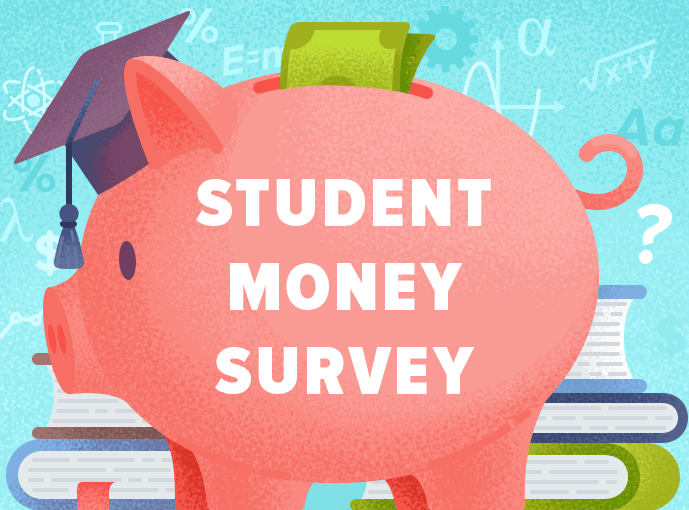Attending college can be exciting but also at times scary, especially when you consider that most students aren’t taught much about personal finance. Students’ fears have only been intensified recently by soaring inflation and other economic troubles, which threaten to make higher education less affordable. Many students also still have yet to recover from the impact of the COVID-19 pandemic.
In order to learn more about college students’ thoughts about finance and education during these difficult times, WalletHub conducted a nationally representative survey, which found that 93% of students are concerned about the economy. The survey asked about everything from how important a college education is during the pandemic to what financial lessons students have learned. You can find the complete results in the infographic below, along with additional insight from a panel of experts.
Key Stats
- 93% of students are concerned about the economy.
- The number one post-graduation fear among students is not finding a job (36%), followed by student loan debt (30%).
- 20% of students think that a college education is less important due to the COVID-19 pandemic.
- 52% of students say their school is not doing enough to educate them about personal finance.
- Having emergency savings (44%) is the most important financial lesson students have learned from the pandemic, followed by not going into debt (23%) and having a steady job (22%).
Ask the Experts
- WalletHub’s survey found that 93% of students are concerned about the economy. What do you think are the main factors that cause such an overwhelming majority to worry at the moment?
- Why do you think around 1 in 5 students believe college is less important due to the pandemic?
- Around 44% of students say the biggest lesson they’ve learned during the pandemic is that they should have emergency savings. What other things should students keep in mind to overcome periods of financial difficulty?
- What advice do you have for the 36% of students who say their biggest post-graduation fear is not finding a job?
- 52% of students say their school is not doing enough to teach them about personal finance. What measures should schools take in order to offer a more adequate personal finance education?
 David A. Dubofsky
David A. Dubofsky
Retired Professor of Finance – University of Louisville and author of “Your Total Wealth…. The Heart and Soul of Financial Literacy”
What advice do you have for the 36% of students who say their biggest post-graduation fear is not finding a job?
“When one door closes, another one opens.”
This appropriate quote is attributed to Alexander Graham Bell, and you should pay attention to it.
Don’t get discouraged if you cannot find a job. It took me three months to get my first job after graduating with my undergraduate degree. If you want a job, keep trying to find one.
But also consider that the opportunity cost of engaging in other endeavors is lower if you don’t have a job. Consider your education. If you had many well-paying job opportunities you could have taken while you were in school, then there was a high opportunity cost to attending school; if you weren’t in school, you’d be working. Going to school to gain an education is less costly when you have no job. You are not foregoing a wage if you cannot earn a wage.
So, if you cannot get a job after you graduate, consider getting more education. Get a useful second degree or training in an area with better job opportunities. Consider a certificate or other training that will open doors for you. Many masters programs are just one year in duration. Get a degree in data analytics and learn a computer programming language. Get a certificate in accounting. Get certified in a healthcare area. Get an MBA degree where the school guarantees you a paying internship while you are enrolled.
Work hard, pay attention and learn while you are doing any of these things. You will be learning skills that are valued in the workplace. There are many job opportunities in these and other areas, and individuals trained in these areas will likely be in high demand in coming years.
The job market can be cyclical, so there is always some risk you’ll graduate during an employment downturn. Utilize the inability to find a job to your advantage.
52% of students say their school is not doing enough to teach them about personal finance. What measures should schools take in order to offer a more adequate personal finance education?
Many schools offer a 1st or 2nd-year course in personal finance. If they don’t, they should.
Schools can call in finance practitioners to present to students at lunch. The schools can entice students to attend these workshops by offering pizza or sandwiches while they are at the presentation. This could be done weekly with each practitioner providing useful advice about investing, money management, debt, insurance, saving, budgeting, the housing decision, etc. Having a bit of knowledge about all of these things is important in life.
Many schools offer financial planning degrees. As part of that curriculum, students pursuing these degrees could be required to offer seminars to other students about some aspects of personal finance, and design financial plans for students.
Some schools have created Centers to promote financial literacy. The mission of the Student Money Management Center at the University of North Texas is to “ … prepare students to be financially responsible in a rapidly changing world.” Its vision is ”… for students to have the knowledge, resources, and confidence to become financially responsible.”
Schools can utilize their alumni, particularly those who work in financial services, to provide financial mentoring to students.
The bottom line is that every student attending a university should have the opportunity to gain some personal financial literacy. Universities should offer an array of these opportunities, and many do. if your school isn’t offering enough, become involved in efforts to get your school to do more. Talk to faculty, administrators, advisory boards, and successful alumni.
WalletHub’s survey found that 93% of students are concerned about the economy. What do you think are the main factors that cause such an overwhelming majority to worry at the moment?
ONLY 93%?? The other 7% who are not concerned must either be so wealthy it doesn’t matter to them, or they are not paying attention. Moreover, I’d bet that 93% of ALL Americans are also concerned about the economy, and for the same reasons that students are concerned.
The reasons are obvious. Just turn on the evening news. War. Pandemic. Inflation. Shortages. Excessive debt and borrowing by individuals, corporations, and governments. Climate change.
The list goes on. While this is a depressing question to ask, the “good” news is that EVERY generation has had its menu of factors that induced economic worry. When I was a student in the early 1970s, what was creating our concern about the economy? War. Inflation. Shortages. Excessive debt and borrowing. Ecological carnage.
Except for the pandemic, the reasons for concern were the same 50 years ago as they are today.
Why do I call it “good” news? For 50 years, we pretty much subdued all these reasons for concern. And we lived through them and prospered despite them.
Students today should retain the optimism that naturally comes with youth. We conquered our problems in the past. Be confident that we will conquer them again.
Try to protect yourself from a poor economy by getting a good education that prepares you with useful skills to succeed in any economic environment. Never stop learning. Never stop adding credentials to your resume. Work hard. Think critically, independently, and creatively. Be upbeat and optimistic.

